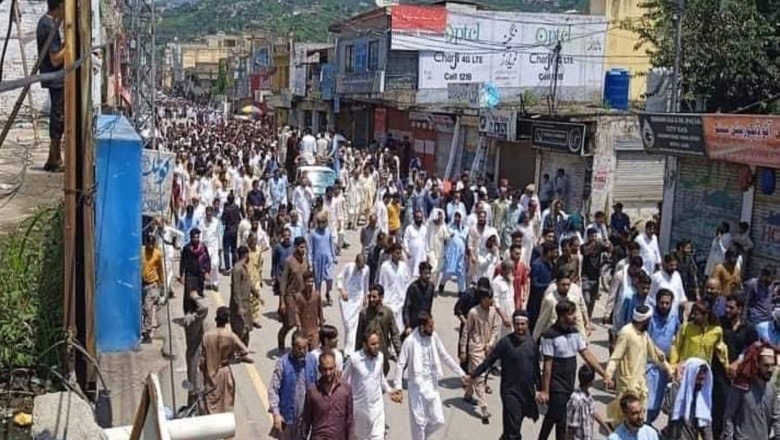
views
February 5 is a national holiday in Pakistan, observed as Kashmir Solidarity Day to mark its so-called solidarity with Kashmiri people. The 2024 solidarity day has, however, taken an unexpected turn as, paradoxically, the very region that is traditionally meant to serve as the epicentre of this solidarity campaign — Pakistan-Occupied Jammu and Kashmir (POJK), including Gilgit-Baltistan — has emerged as a hotbed of dissent. These regions have witnessed widespread protests in recent months, signalling a growing discontent among the populace against what they perceive as imperialistic policies imposed by Islamabad. The unrest has reached a point where a massive region-wide shutdown has been scheduled, coinciding with the government’s Kashmir Solidarity Day façade.
Most significantly, POJK activists based out of Scotland have given a call for setting up the POJK government in exile. Mirza told this writer in a telephonic conversation that Kashmiris refuse to be at the receiving end of the Pak establishment any more. “Pak establishment has done nothing but exploited and ruined us. There are no basic amenities and political freedom for common people,” says Mirza who is spearheading the campaign to set up the government in exile for POJK.
For long, the Pakistani establishment, led by its powerful military, has milked Kashmir for its power consolidation as well as to hide its internal as well as external failures. Observed since 1991 to commemorate what essentially has been its sponsored insurgency in Jammu and Kashmir, multiple actors in Pakistan. This includes the Pakistan Army and political groups along with terror outfits such as Jamaat-ud-Dawa (the civilian face of terrorist Lashkar-e-Taiba), Hizbul Mujahideen and Jaish-e-Mohammed.
What distinguishes 2024 is how the very territories of Kashmir that have been illegally occupied by Pakistan since its creation in 1947, such as the POJK, including Gilgit-Baltistan (GB), are witnessing sustained protests against the policies of the Pakistani government towards these regions. Interestingly, Pakistan refers to a part of this occupied territory as ‘Azad’ J&K, even as in reality it has maintained a strong military grip over these areas, with overwhelming powers vested in Pakistani Army corps commanders deployed in these regions. Both these regions of POJK and GB lack political representation and autonomy in local governance, with locals often lamenting that the decisions affecting their lives are often made in Islamabad without considering their needs and aspirations. This has resulted in overwhelming systematic discrimination and economic marginalisation.
Mirza cites an interesting example in this regard as he explained, “Pakistan government buys electricity from the occupied territory(POJK) at the rate of Rs 2.60 per unit and sells it for Rs 53 per unit in the rest of Pakistan.”
“The situation on the ground is so bad that this region can’t be compared with even the poorest city of Pakistan. We have been pushed down so much that we can only compare POJK with some of the least developed African nations. Its sheer oppression and exploitation of our human and natural resources that has become unbearable now,” he adds.
The Pakistani government has also been accused of undertaking a systematic demographic alteration campaign, especially in the Shia-dominated Gilgit-Baltistan. The military dominated Pakistani establishment has encouraged the influx of outsiders, mostly Punjabi Sunnis, to alter the demographics and dilute the distinct cultural identity of these regions. At the time of GB occupation in 1947 by Pakistan, Shias constituted 80 per cent of the region’s population, which has been significantly reduced below 50 per cent by 2020, as per local organisations. It has sustained made the region ripe for sectarian tensions The resultant sectarian tensions have offered an alibi to the Pakistani government to maintain a tight security control in the region. It has targeted the religious leaders of the Shia community over trivial pretexts, as evidenced by the detention of prominent cleric Agha Baqir al-Hussaini in September 2023.
Furthermore, the government of Pakistan has engaged in a systematic land grab in POJK and GB over the last decade under the garb of China-Pakistan Economic Corridor (CPEC). Apart from acquiring limited private lands, the Pakistani government has engaged in appropriating community lands under the controversial “Khalsa Sarkari” laws, which empowers the state to take over the “ownership of barren or uncultivated land”, leaving locals without any rights over their lands. For instance, Senator Farhatullah Babar of Pakistan People’s Party (PPP) in one of his speeches a few years back laments that Pakistan has denied GB people any rights over their lands. “Gilgit-Baltistan is the only region where people do not own their lands, where people have been denied the right over their lands because giving them land rights would inevitably give locals rights over their resources.”
For months, the people in POJK and GB have been protesting against the draconian tax regime of Islamabad, which has wreaked havoc on the already miserable lives of locals amidst high inflation. As such, this demonstrates a deep-seated dissatisfaction amongst the residents of POJK, including those in GB, who have grown increasingly disillusioned with the imperialistic policies imposed by Islamabad be it their political disenfranchisement, economic marginalisation, and concerns about demographic changes.
It may be recalled that Pakistan introduced Gilgit-Baltistan Revenue Authority Bill 2022 in August 2022 through which a several new taxes were imposed on 135 items. This had invoked widespread protests across the region bringing life to halt in this Pakistan occupied impoverished region of Jammu and Kashmir.
Another issue that has invited protests from people is the gradual increase in the wheat prices by the government. Amidst its economic downturn that has worsened in recent years with billions of dollars of accumulated external debt, Pakistan asked the local GB administration in March 2023 to rationalise the wheat prices with the aim of withdrawing the subsidies over the commodity over time. Given that wheat is a staple food of the region, the increasing prices increasingly burdened the locals amidst the rising retail inflation even as the economic conditions worsened further in this impoverished region. This rescinding of this policy has emerged as one the main demands of the people during the ongoing protests.
Likewise, the other main issue that has constituently drawn widespread criticism and discontent among the people of POJK and GB is the growing electricity charges with increasing load shedding. For instance, the government imposes 13 types of taxes on an electricity bill including fuel (tax). This defies rationality given that the electricity generated within the territorial limits of the POJK is based on hydropower.
POJK and GB generate over 2500 MWs of electricity, mostly contributed by Mangla Dam power project (1000 MWs) and Neelum Jhelum Hydroelectric Project (969 MWs). Against this production, the cumulative peak electricity demands of POJK and AJK are 700-800 MWs. However, most of the electricity is transmitted to the Pakistan Grid in Punjab province by the government of Pakistan, from where POJK and GB governments are forced to buy the electricity at commercial rates. Despite this, the residents of these occupied regions are subjected to extended hours of power outages round the year. Grotesquely, the Pakistani government charges fuel tax (fossil tax usually charged for thermal electricity) from the electricity consumers of POJK and GB even as it generates surplus electricity from its water resources, defying any logic for its draconian yet imperial attitude towards the people of occupied Jammu and Kashmir.
The people of POJK and GB have established Awami Action Committees (AAC), comprising trade organisations, transporters, political groups, civil society members, and all other domains, to spearhead the protests and fight the draconian tax regime and imperial policies of the Pakistani government. To bring attention to their debilitating socioeconomic conditions, the Awami Action Committees have ingeniously synchronized a region-wide total shutdown to coincide with the Kashmir Solidarity Day, thereby puncturing the falsified narrative of Pakistani establishment on its concern about Kashmiris.
According to Mirza, “Pakistan started celebrating Kashmir Solidarity Day to create a fake narrative targeting India but the reality is that Pakistan is the real oppressor. So to bust this fake narrative, we will celebrate February 5 as ‘People’s Rights Day’.”
In its meeting on January 6, 2024 at Kotli, POJK, the Joint Awami Action Committee announced a “complete shutter-down and wheel-jam strike” for 5 February 2024. The statement further stated that the “oppressed and subjugated people” of POJK will make the so-called Kashmir Solidarity Day into “a People’s Rights Day” to express their dissatisfaction with the governing elite of Pakistan. Prominent Kashmiri rights activist Professor Sajjad Raja held that the people in “in POJK believe that Pakistani solidarity is false & fabricated as in fact Pakistan is the basic root-cause of all the problems of the people of #JammuAndKashmir”.
This rise of people in POJK and GB against the imperial policies of Pakistan despite the stringent military hold by Pakistan Army that penalises every cent of dissent shows the level of discontent in the region. This also deflates the narrative of the Pakistani government which has over the years used the Kashmir card to mislead its people as well as international community while denying the Kashmiri people under its occupation basic rights of survival as it exploited its mineral resources to sustain its military empire.
As the people make their voices heard, it is incumbent on the international community to raise the issues of Kashmiris under the occupation of Pakistan lest their basic survival is further jeopardised.
The writer is an author and columnist and has written several books. His X handle is @ArunAnandLive. Views expressed in the above piece are personal and solely that of the author. They do not necessarily reflect News18’s views.















Comments
0 comment